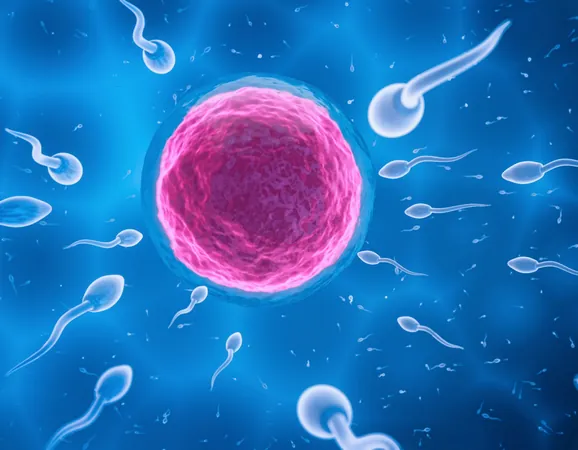
Unlocking the Secrets of Human Egg Longevity: How They Survive for Decades in Low-Energy Mode
2025-07-20
Author: Jia
Human Eggs: Nature’s Timekeepers
Imagine human egg cells lying dormant in the ovaries from before birth, sometimes for up to 40 years, patiently waiting to spark new life. A groundbreaking study reveals that these remarkable cells manage to survive for decades by operating in a unique 'low-energy mode,' conserving energy while maintaining their integrity.
Revolutionary Research from Barcelona
Led by Dr. Elvan Böke and her team at the Centre for Genomic Regulation in Barcelona, this research examined over 100 freshly donated human oocytes. Their findings shed light on how these cells manage to keep themselves pristine over the years.
The Metabolic Mystery
Women are born with a staggering one to two million immature oocytes, but only a few hundred will ever mature. Keeping these cells intact is a monumental challenge, as everyday metabolism produces harmful debris that can damage crucial cellular components like DNA and proteins. To counteract this, cells usually burn through energy to dispose of waste, but that can inadvertently lead to oxidative stress, aging them prematurely.
Cutting-Edge Insights into Cell Behavior
Dr. Böke's team used fluorescent probes to study live oocytes, revealing a striking picture: the signals from active waste disposal units (lysosomes and proteasomes) inside the egg cells were about half as robust compared to nearby supportive cumulus cells. This indicates a significant reduction in metabolic activity, a clever strategy that allows the cells to maintain their youthful condition.
A Pre-Ovulation Cleanup
In a surprising twist, the research observed mature eggs preparing for ovulation by actively pushing waste-removal systems to the edge of the cell and ejecting them. This 'spring cleaning' just before ovulation helps the eggs further reduce their metabolic burden, ensuring they are in prime condition for fertilization.
Implications for In Vitro Fertilization (IVF)
With around 2.6 million IVF attempts worldwide each year, the quality of egg cells plays a crucial role in successful pregnancies. Traditional methods often lead to subpar egg quality due to artificial maturation processes. This study highlights the importance of preserving the natural low-energy state of oocytes—suggesting that doing less could be more beneficial in IVF practices.
Rethinking IVF Protocols
Instead of pushing for higher metabolic activity through supplements, Dr. Böke's team proposes a shift towards gentler culture methods that mimic the eggs' natural resting state. Future IVF protocols might incorporate drugs that reduce unnecessary cellular activity, maintaining the eggs' longevity.
Next Steps: A New Frontier in Fertility Research
The team plans further investigations into eggs from older women and those who have experienced failed IVF cycles. Understanding whether the metabolic quietude diminishes with age could open doors to novel treatments for age-related infertility problems.
A Bright Future for Egg Longevity Research
This study, published in The EMBO Journal, not only broadens our understanding of human egg longevity but may also lead to significant advancements in reproductive technologies, promising a future where age is less of a barrier to conception.


 Brasil (PT)
Brasil (PT)
 Canada (EN)
Canada (EN)
 Chile (ES)
Chile (ES)
 Česko (CS)
Česko (CS)
 대한민국 (KO)
대한민국 (KO)
 España (ES)
España (ES)
 France (FR)
France (FR)
 Hong Kong (EN)
Hong Kong (EN)
 Italia (IT)
Italia (IT)
 日本 (JA)
日本 (JA)
 Magyarország (HU)
Magyarország (HU)
 Norge (NO)
Norge (NO)
 Polska (PL)
Polska (PL)
 Schweiz (DE)
Schweiz (DE)
 Singapore (EN)
Singapore (EN)
 Sverige (SV)
Sverige (SV)
 Suomi (FI)
Suomi (FI)
 Türkiye (TR)
Türkiye (TR)
 الإمارات العربية المتحدة (AR)
الإمارات العربية المتحدة (AR)